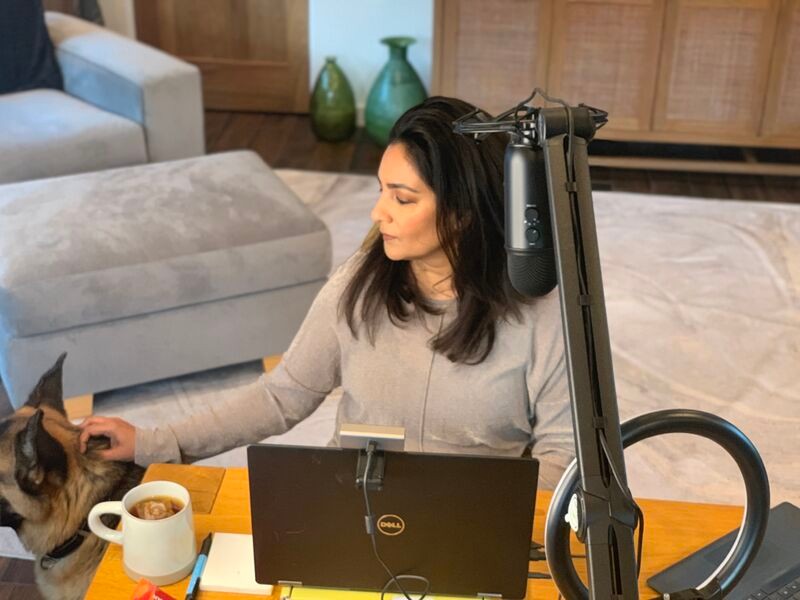We caught up with the brilliant and insightful Deepa Purushothaman a few weeks ago and have shared our conversation below.
Deepa , appreciate you joining us today. We’d love to have you retell us the story behind how you came up with the idea for your business, I think our audience would really enjoy hearing the backstory.
My book and my company, nFormation, stemmed out of a comment a public company CFO shared with me. She said, I sit in a seat of power and I don’t feel powerful. I was startled and yet it felt so familiar. I wanted to study this concept and understand it since I heard this over and over again from the women I interviewed. Most of the women I interviewed believed erroneously that, once they were a senior leader in their organizations, they could be more of themselves. But once they reached the top, they were more invested in the company, and it was even harder to speak up, stand out, and be different.
One woman I interviewed shared, “They promote you, but ultimately, what they want is a skirt- wearing dark- skinned white leader with an accent. We have to let go of the fairy tale of “one day” and realize that no matter what stage we are at in our careers, each action to conform is actually a decision we make, even if it might not feel like it in the moment.”
I spent over twenty years in corporate America. I often found myself a first, few and an only.
I always had a real passion for inclusion and helping other women rise. In the years before I left Deloitte, I had a more formal role as the managing partner for WIN, Deloitte’s pioneering program to recruit, retain and advance women.
In an attempt to better understand this dilemma of being in a seat of power, but not feeling powerful, I started gathering WOC in small gatherings. I started to see patterns in what we were facing and I thought I can do something about this to change it for the women who come after me.
So I co-founded nFormation as a way to provide a safe, brave and new space for WOC to tap into community, and pioneer ways to advance that felt true to who they were, and where they came from.



As always, we appreciate you sharing your insights and we’ve got a few more questions for you, but before we get to all of that can you take a minute to introduce yourself and give our readers some of your back background and context?
I really think of myself as a professional truth teller these days.
Whether on a Ted stage, as an author (of The First, The Few, The Only), holding safe space for other WOC, or guiding allies on best practices, so much of my work is claiming, naming and sharing the truths that are too often overshadowed, or swept under a rug.
The best way to connect with me is either on LinkedIn, where I regularly post updates, resources and reflections, or via my newsletter (which you can sign up for on my site).


Can you share a story from your journey that illustrates your resilience?
When people ask me about difficult situations and finding my voice, I often think back to meeting my first big client as a new Partner. The client was a brash CTO who liked to drop the f-bomb and
hated consultants — to say he was intimidating is an understatement.
I was not a technical person, so I was already worried about meeting him from a content
standpoint. I prepared for weeks and I will never forget as I walked into his office for our meeting,
he took one look at me, and said, “If I had a daughter, she would be older than you so what could
you possibly have to tell me?”.
I took what I assume to be a visible gulp and gathered all the confidence I could muster and said, “I
have some interesting information about how broken your organization is. And if you give me 30
minutes and I don’t tell you something you don’t already know, I will give you back the rest of our
time together and never ask for another meeting.”
I had his attention.
We talked for almost two hours and he became one of my biggest buyers for more than 2 years. In
that interaction, and that moment, I learned that my leadership style is truth telling, and it served
me well. Because I was young and looked young, I could not lead with my experience or expertise.
That would have been hard. I had to play the cards I was dealt, so to speak, and that meant using
directness to my advantage.
It can be easy to get caught up in other people’s perception of you, but don’t let it consume you.
You get to define what they walk away with. Often, it is in challenging situations that we find our
voice.
Learning and unlearning are both critical parts of growth – can you share a story of a time when you had to unlearn a lesson?
I had to unlearn the idea that if I sacrifice myself to get to the top, once there, I’ll be able to reclaim it.
Women of color have been taught that if we work 4 times as hard as our white peers, we just might get a seat at the table, but when we get that seat, we realize we’re expected to maintain the status quo, no matter how toxic it might be.
We need to let go of the idea that we must compromise to get power and then we get to do what we want because that rarely happens.
Contact Info:
- Website: https://www.deepapuru.com
- Instagram: https://www.instagram.com/deepa.puru/
- Facebook: https://www.facebook.com/deepa.purushothaman.75
- Linkedin: https://www.linkedin.com/in/deepapuru/
- Twitter: https://twitter.com/deepapuru
- Other: https://www.amazon.com/dp/0063084716?tag=imprintweb-20
Image Credits
NA


